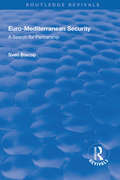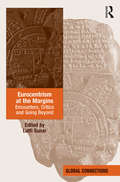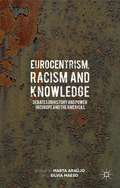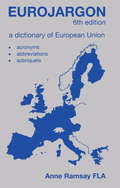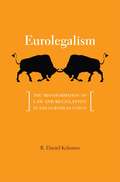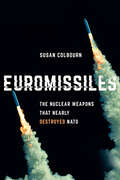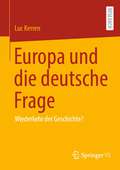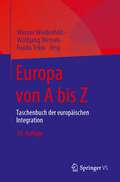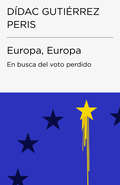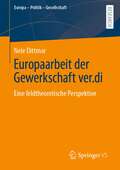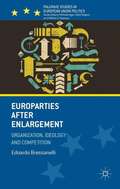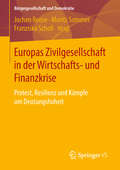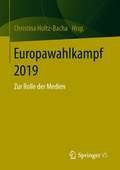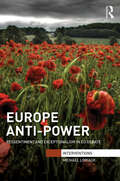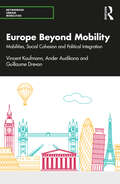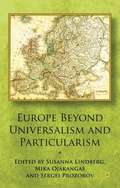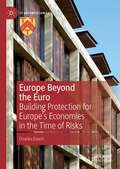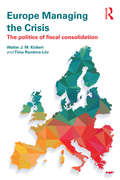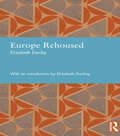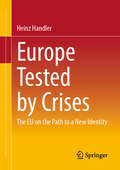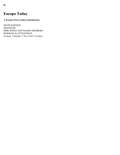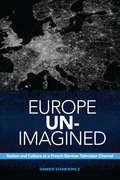- Table View
- List View
Euro-Mediterranean Security: A Search for Partnership (Routledge Revivals Ser.)
by Sven BiscopThis title was first published in 2003. This work provides a clearer understanding of the EU's approach towards security in the Mediterranean. After examining the EU's interests and the potential threats to security in the region, it analyzes EU security policy towards the region as a whole, through the Euro-Mediterranean Partnership, and towards all disputes and conflicts in the area. It recommends opening up the European Security and Defence Policy to Mediterranean participation, in order to establish a deep and equitable security partnership between both shores. The book argues that this way the EU could implement its innovative comprehensive and co-operative approach to security. Rather than focusing on the military aspect alone, this approach takes into account all dimensions of security (political, socio-economic, cultural and ecological) and is based on partnership rather than confrontation. It therefore contrasts quite sharply with the policies advocated in the US National Security Strategy.
Eurocentrism at the Margins: Encounters, Critics and Going Beyond (Global Connections)
by Lutfi SunarEurocentrism remains a prevailing feature of Western-dominated social scientific perspectives, tending to ignore alternative views originating outside the West and thus maintaining a form of scholarly hegemony. As such, there is an urgent need to reconsider Eurocentrism in social science, to ask whether it constitutes an obstacle to understanding social problems and whether it is possible to go beyond Eurocentrism in the construction of reliable, more universal knowledge. At the same time, certain questions persist, particularly with regard to the extent to which recent revisionist challenges have really contributed to the surmounting of Eurocentric domination, and whether the constant repetition of the concept serves to reinforce it. This book engages with the central problems of Eurocentrism in the social sciences, bringing together the work of scholars from around the world to offer a critique of this perspective from both European and non-European positions, thus shedding light on the binaries that often come into being in debates in this field. Thematically organised and addressing a range of questions, including Eurocentrism in historical studies, in the understanding of religion and civilisation and in the study of international relations, as well as in the institutionalisation and professionalisation of research and discourses on modernisation in the Middle East, Eurocentrism at the Margins will appeal to scholars with interests in knowledge production and circulation, and Eurocentrism and post-colonialism in the social sciences.
Eurocentrism, Racism and Knowledge: Debates on History and Power in Europe and the Americas
by Marta Araújo Silvia Rodríguez MaesoThis collection addresses key issues in the critique of Eurocentrism and racism regarding debates on the production of knowledge, historical narratives and memories in Europe and the Americas. Contributors explore the history of liberation politics as well as academic and political reaction through formulas of accommodation that re-centre the West.
Eurodrugs: Drug Use, Markets And Trafficking In Europe
by Nigel South Vincenzo RuggieroFirst Published in 1995. Routledge is an imprint of Taylor & Francis, an informa company.
Eurojargon: A Dictionary of the European Union
by Anne RamsayFirst Published in 2001. Eurojargon explains the meaning of more than 3,000 acronyms, abbreviations and sobriquets used across the European Union to identify European projects, schemes, and agencies (often used to avoid the problem of translation): many have crept into everyday use over recent years and have become almost a language in themselves. Eurojargon is an attempt to bring together those used within the context of the EU.Some have been included that are from a wider context that that of the EU, such as European associations and organizations recognized by the EU. Addresses are given where appropriate. Uniquely, references to official texts are cited in brackets after the description. The alphabetical listing follows the principle of "letter by letter". Any descriptive text in capital letters indicates that there is an entry under that heading in the alphabetical sequence. The sixth edition of Eurojargon contains a large number of additional entries as well as updated information on those included in earlier editions.Eurojargon is aimed at a wide range of user-specialist consultants in EU information, academics and students, information specialists, economists and, politicians.
Eurojihad
by Cheryl Benard Angel RabasaThroughout history, factors of radicalization have involved social and economic conditions and issues of identity. Patterns of Islamist radicalization in Europe reflect the historical experience of European Muslim communities, particularly their links to their home countries, the prevalence of militant groups there, and the extent to which factors of radicalization in Muslim countries transfer to European Muslim diasporas. Eurojihad examines the sources of radicalization in Muslim communities in Europe and the responses of European governments and societies. In an effort to understand the scope and dynamics of Islamist extremism and terrorism in Europe, this book takes into account recent developments, in particular the emergence of Syria as a major destination of European jihadists. Angel Rabasa and Cheryl Benard describe the history, methods and evolution of jihadist networks in Europe with particular nuance, providing a useful primer for the layperson and a sophisticated analysis for the expert.
Eurolegalism: The Transformation of Law and Regulation in the European Union
by R. Daniel KelemenDespite western Europe's traditional disdain for the United States' "adversarial legalism," the European Union is shifting toward a very similar approach to the law, according to Daniel Kelemen. Coining the term "eurolegalism" to describe the hybrid that is now developing in Europe, he shows how the political and organizational realities of the EU make this shift inevitable. The model of regulatory law that had long predominated in western Europe was more informal and cooperative than its American counterpart. It relied less on lawyers, courts, and private enforcement, and more on opaque networks of bureaucrats and other interests that developed and implemented regulatory policies in concert. European regulators chose flexible, informal means of achieving their objectives, and counted on the courts to challenge their decisions only rarely. Regulation through litigation-central to the U.S. model-was largely absent in Europe. But that changed with the advent of the European Union. Kelemen argues that the EU's fragmented institutional structure and the priority it has put on market integration have generated political incentives and functional pressures that have moved EU policymakers to enact detailed, transparent, judicially enforceable rules-often framed as "rights"-and back them with public enforcement litigation as well as enhanced opportunities for private litigation by individuals, interest groups, and firms.
Euromissiles: The Nuclear Weapons That Nearly Destroyed NATO
by Susan ColbournIn Euromissiles, Susan Colbourn tells the story of the height of nuclear crisis and the remarkable waning of the fear that gripped the globe. In the Cold War conflict that pitted nuclear superpowers against one another, Europe was the principal battleground. Washington and Moscow had troops on the ground and missiles in the fields of their respective allies, the NATO nations and the states of the Warsaw Pact. Euromissiles—intermediate-range nuclear weapons to be used exclusively in the regional theater of war—highlighted how the peoples of Europe were dangerously placed between hammer and anvil. That made European leaders uncomfortable and pushed fearful masses into the streets demanding peace in their time. At the center of the story is NATO. Colbourn highlights the weakness of the alliance seen by many as the most effective bulwark against Soviet aggression. Divided among themselves and uncertain about the depth of US support, the member states were riven by the missile issue. This strategic crisis was, as much as any summit meeting between US president Ronald Reagan and Soviet general secretary Mikhail Gorbachev, the hinge on which the Cold War turned. Euromissiles is a history of diplomacy and alliances, social movements and strategy, nuclear weapons and nagging fears, and politics. To tell that history, Colbourn takes a long view of the strategic crisis—from the emerging dilemmas of allied defense in the early 1950s through the aftermath of the INF Treaty thirty-five years later. The result is a dramatic and sweeping tale that changes the way we think about the Cold War and its culmination.
Europa und die deutsche Frage: Wiederkehr der Geschichte?
by Luc KerrenMit der Wiedervereinigung schien die deutsche Frage, welche bis 1990 über Jahrhunderte das europäische Mächtegleichgewicht bestimmt hatte, eine endgültige Antwort erhalten zu haben, da das Land in der Mitte des Kontinents erstmals in seiner Geschichte „von Freunden umzingelt“ war. Spätestens mit dem Aufkommen der Eurokrise verdeutlichte sich jedoch, dass die Größe und Stärke des vereinten Deutschlands innerhalb Europas weiterhin als ambivalent wahrgenommen wurde: Einerseits kam es nicht umher, als „unverzichtbare Nation“ die Initiative zu übernehmen, gleichzeitig wurde es aber verdächtigt, hegemoniale Ambitionen an den Tag zu legen. Luc Kerren zeigt in diesem Buch, dass dieses Muster in der Folge ebenfalls während der Migrationskrise 2015/16 sowie im Verhältnis zu Russland zu beobachten war. Somit ist auch die Berliner Republik mit der Herausforderung konfrontiert, innerhalb Europas die Balance zu wahren: Zwischen einer „rücksichtslosen Führung“ und einer „führungslosen Rücksicht“.
Europa von A bis Z: Taschenbuch der europäischen Integration
by Wolfgang Wessels Werner Weidenfeld Funda TekinDieses Taschenbuch bietet Europa zum Nachschlagen: In über 100 Sachbeiträgen erklären renommierte EuropaexpertInnen wissenschaftlich fundiert und zugleich verständlich alle wichtigen Themen und Begriffe aus Politik, Wirtschaft und Geschichte der europäischen Einigung. Es erscheint in aktualisierter und erweiterter Fassung schon in der 16. Auflage und richtet sich an alle Europa-Interessierten, die sich gezielt und zuverlässig über den neuesten Stand in europapolitischen Fragen informieren wollen.Das Taschenbuch „Europa von A bis Z“ wird freundlicherweise vom Auswärtigen Amt gefördert. Das Institut für Europäische Politik (IEP) wird im Rahmen des Citizens, Equality, Rights and Values Programms 2021–2027 der Europäischen Union gefördert. Für die Inhalte zeichnet allein das IEP verantwortlich.
Europa von A bis Z: Taschenbuch der europäischen Integration
by Wolfgang Wessels Werner Weidenfeld Funda TekinDieses Taschenbuch bietet Europa zum Nachschlagen: In über 100 Sachbeiträgen erklären renommierte Europaexpertinnen und -experten wissenschaftlich fundiert und zugleich verständlich alle wichtigen Themen und Begriffe aus Politik, Wirtschaft und Geschichte der europäischen Einigung. Es erscheint in aktualisierter und erweiterter Fassung schon in der 15. Auflage und richtet sich an alle Europa-Interessierten, die sich gezielt und zuverlässig über den neusten Stand in europapolitischen Fragen informieren wollen.
Europa, Europa: En busca del voto perdido (Colección Endebate #Volumen)
by Dídac Gutiérrez-PerisLa mejor explicación de los nuevos poderes del parlamento europeo y la importancia de las elecciones. ¿Son las elecciones europeas una pérdida de tiempo y la UE una máquina no democrática? Esa es una idea bastante extendida, pero este ameno resumen de los intentos por democratizar las instituciones europeas y su culminación en la última reforma que concede grandes poderes al Parlamento Europeo la desmiente. Son las segundas elecciones con mayor participación del mundo, tras la India y por delante de Estados Unidos, y eligen un Parlamento con capacidad de intervenir en todos los asuntos relevantes de los países miembros.
Europaarbeit der Gewerkschaft ver.di: Eine feldtheoretische Perspektive (Europa – Politik – Gesellschaft)
by Nele DittmarIn der sozialwissenschaftlichen Debatte wird oft ein pessimistisches Bild der Bedingungen und Perspektiven europäischen gewerkschaftlichen Handelns gezeichnet. Selten wurde aber bisher in eine nationale Gewerkschaft hineingeschaut und gefragt, ob und inwiefern die innergewerkschaftlichen (Macht-)Verhältnisse ihre europabezogene Arbeit beeinflussen. Diese Arbeit setzt dort an und lenkt auf der Suche nach den Möglichkeiten und Grenzen gewerkschaftlicher Interessenvertretung in Europa den Blick in eine nationale Gewerkschaft hinein. Am Beispiel der Vereinten Dienstleistungsgewerkschaft ver.di bringt dies einerseits europabezogene Praktiken zum Vorschein, die aus einer Makroperspektive verdeckt bleiben. Andererseits werden neue Erkenntnisse zu Hindernissen gewerkschaftlicher Europaarbeit gewonnen, die in den innerorganisatorischen Strukturen und Machtrelationen selbst begründet sind. Für den Blick in die Gewerkschaft wird in dieser Arbeit eine feldtheoretische Perspektive eingenommen. Damit wird ihre „Europaarbeit“ durch das Zusammenspiel der Position der Gewerkschaft in anderen Feldern (wie dem der deutschen und der europäischen Arbeitsbeziehungen) und den Kräfteverhältnissen innerhalb der Gewerkschaft selbst erklärt.
Europarties after Enlargement
by Edoardo BressanelliBy comparing the importance of representative democracy to the EU as enshrined in the Lisbon Treaty with the political systems in the EU's newest member states, this study explores whether representative democracy can really exist in an enlarged EU and explores the constraints and opportunities for political parties operating the in the EU.
Europas Zivilgesellschaft in der Wirtschafts- und Finanzkrise: Protest, Resilienz Und Kämpfe Um Deutungshoheit (Bürgergesellschaft und Demokratie)
by Jochen Roose Moritz Sommer Franziska SchollDer Sammelband beleuchtet unterschiedliche Perspektiven auf zivilgesellschaftliche Akteure in der europäischen Wirtschafts- und Finanzkrise und ordnet diese theoretisch ein. Dabei geht der Blick auf zivilgesellschaftliche Aspekte in seiner ganzen Breite. Er betrachtet Dynamiken der öffentlichen Auseinandersetzung, zivilgesellschaftliche Resilienz mit (oft lokalen) Initiativen zur Bearbeitung der Krisenfolgen und transnationaler Solidarität sowie Proteste, Protestorganisationen und Protestparteien. Dabei richtet sich der Blick auf die südlichen Krisenländer, aber auch auf Deutschland. Insbesondere gehen aktuelle Ergebnisse derzeit laufender, zum Teil international vergleichender Forschungsprojekte in den Band ein.Der Inhalt• Krisendiskurse und kollektive Deutungsmuster• Zivilgesellschaftliche Akteure in der Krise• Implikationen für die BewegungsforschungDie ZielgruppenDer Band ist relevant für alle, die sich mit der Entwicklung Europas und der Zivilgesellschaft beschäftigen. Er bietet aktuelle Forschungsergebnisse für Wissenschaftler/innen, Studierende und interessierte Laien in den Feldern Bewegungsforschung, Politikwissenschaft, Soziologie, Kulturwissenschaft und Europawissenschaft, insbesondere Südeuropa.Die HerausgeberDr. Jochen Roose ist wissenschaftlicher Mitarbeiter am Deutschen Institut für Urbanistik, assoziierter Wissenschaftler am Institut für Protest und Bewegungsforschung und Privatdozent an der Freien Universität Berlin. Moritz Sommer promoviert am Institut für Soziologie der Freien Universität Berlin und ist Leiter der Geschäftsstelle des Instituts für Protest- und Bewegungsforschung.Franziska Scholl ist assoziierte Wissenschaftlerin des Instituts für Protest- und Bewegungsforschung.
Europawahlkampf 2019: Zur Rolle der Medien
by Christina Holtz-BachaDer Band versammelt Beiträge, die Befunde aus Untersuchungen zum Europawahlkampf 2019 in und mit den traditionellen und den neuen Medien präsentieren. In Anbetracht des Erstarkens rechtspopulistischer Parteien und des Nationalismus galt die Europawahl 2019 als Schicksalswahl für Europa, was für den Wahlkampf ein besonderes Engagement auf Seiten der Politik wie auch der Medien erwarten ließ. Gegenüber dem Europawahlkampf 2014 kam zudem den sozialen Netzwerken gesteigerte Bedeutung zu, die den politischen Akteuren ein zusätzliches Kampagneninstrument bieten, aber auch den Wahlkampf abseits der öffentlichen Beobachtung ermöglichen.
Europe Anti-Power: Ressentiment and Exceptionalism in EU Debate (Interventions)
by Michael LoriauxThe EU seeks to define a role for itself in power politics while remaining firm in its rejection of power politics. In order to make power compatible with the European project, EU debate has appended a number of progressive adjectives to the word "power," adjectives like "civilian" and "normative," among others. This book asks what is power, such that it can be modified, tamed, and modulated by adjectives, yet remain "powerful"? Loriaux passes EU debate on power through the mill of phenomenological and post-phenomenological analysis, juxtaposing it against writings by Machiavelli, Agamben, Thucydides, Nietzsche, Patocka, and Levinas. The book locates power in "power/play," the theatrical, staged representation of threat that generates aesthetic effect and undecidability. Power/play endows the word "power" with perlocutionary force, which the adjectives of EU "qualified" power actually enhance rather than moderate. Loriaux argues that EU discourse on power therefore risks inviting EU "exceptionalism," or risks lapsing into an expression of EU ressentiment, rather than advancing a new, progressive understanding of "power." If European Union is to remain steadfast in its opposition to power politics, it must represent itself as "anti-power." This book will be of interest to those who work in the area of EU foreign policy, as well as to those who have a more general theoretical interest in the concept of power.
Europe Beyond Mobility: Mobilities, Social Cohesion and Political Integration (Networked Urban Mobilities Series)
by Vincent Kaufmann Ander Audikana Guillaume DrevonMobility, which has represented a critical scientific category and political driver, is currently under strong public scrutiny: has mobility lost its potential for social cohesion and political integration? Europe Beyond Mobility: Mobilities, Social Cohesion and Political Integration assesses this question by focusing on the European integration process, conceptualized as a political project for the promotion of different flows of mobility. Mobility has been a fundamental tool for territorial strength and political integration among European countries. Based on a realistic understanding of the potentials and limits of mobility, this book pleads for a "resonant mobility" in the interest of a renovated European integration process. It examines how, in opposition to those advocating for national borders and mobility restrictions, the EU needs to explore new regulatory models which limit mobility’s adverse social, economic, and environmental impacts and make accessible the benefits of alternative flow models. It also provides an analytical framework for the study of current trends of mobility limitation, migration restriction and re-bordering, and offers a complementary and innovative framework for the study of globalization. Europe Beyond Mobility will be of interest to academics and students as well as policy makers and practitioners internationally in the fields of mobility, migration and border studies.
Europe Beyond Universalism And Particularism
by Susanna Lindberg Mika Ojakangas Sergei ProzorovResulting from an interdisciplinary dialogue between philosophy, political science and International Relations about Europe as a political community this volume rethinks the European political project beyond the rigid opposition between universalism and particularism approaching Europe as a space of the exposure of differences to each other.
Europe Beyond the Euro: Building Protection for Europe’s Economies in the Time of Risks (St Antony's Series)
by Charles EnochThis book observes that a key determinant of Europe’s welfare over the coming decades will be how the region manages crises, both financial and societal. It examines how key institutional developments, such as Economic and Monetary Union, reflected differential integration (DI) in the EU, but argues that modern-day risks are highly interconnected, and their management therefore has to be inclusive. In that connection it looks in particular at the European Systemic Risk Board (ESRB), whose mandate to protect financial stability also gives it relevance with regard to other crises. The book considers that the strengthening of this institution, and bringing it to the fore, would help EU member states, as well as countries around the EU including applicant nations, to manage financial and societal risks, including COVID-19 and the transition to a green economy, thus safeguarding the economies of Europe. It builds on a model of the EU allowing for DI in some activities, while ensuring sound governance arrangements between those inside and those outside that activity, and embodying inclusivity in the fundamentals of the EU, including in the management of risk.
Europe Managing the Crisis: The politics of fiscal consolidation
by Walter Kickert Tiina Randma-LiivStudies of the recent financial crisis have been largely dominated by economists, but the similarities and differences between European countries' response reflect both economic and political perspectives which have resulted in considerable differences in their decisions. Drawing on uniquely comprehensive research data, this book presents an in-depth comparative analysis of how 14 European governments tackled the challenge of fiscal consolidation, and analyses the political decision-making behind these measures. By exploring national responses not just in fiscal terms, but also from a political perspective, it reveals that decision making has been driven by political factors with profound effects on public administration and management. This ground-breaking book fills an important gap in the research literature for scholars of public management, public administration and policy, and will be a benchmark for future work on the global economic crisis.
Europe Rehoused (Studies in International Planning History)
by Elizabeth DenbyEurope Rehoused was one of the most influential housing texts of the 1930s, and is still widely cited. Written by the housing consultant Elizabeth Denby (1894-1965) it offered a survey of the nearly two decades of social housing built across Europe since the end of World War One, with the aim of informing British policy makers; as a reviewer declared ‘it has a decidedly propagandist flavour’. Denby was a leading figure in housing debates in the 1930s. Adopting a line in sharp critique of what she saw as the entirely materialist approach of state housing policy, Denby advocated the incorporation of social amenities alongside well-designed and equipped flats and houses, ideally sited within urban areas; by the late 1930s she was a pioneering advocate of the concept of mixed development. Europe Rehoused is divided into two parts. The first considered the origins of the housing problem of the inter-war decades, which Denby dated to the onset of the Industrial Revolution. She then examined the various national factors which influenced the problem: climate, post-war economy and the nature of land ownership. Finally she discussed the financial aspect: the bodies responsible for house building and the nature of the subsidies available for building. This was very much a schematic survey and the second, and largest, part of the book was devoted to individual studies of European practice, and discussed ‘two winners in the War, two losers and two neutrals’: Sweden, Holland, Germany, Vienna, Italy and France. This section was completed with a concluding chapter in which she compared continental work with the British system, and the lessons that could be learnt in this country from abroad. Although Denby’s book was not the only one of its sort, its importance lies in its polemical nature and its advocacy of a rehousing policy which would become widely adopted after WWII. Significant too, is that the book is the voice of a woman who had assumed a significant status as a housing expert in the inter-war decades; Walter Gropius, who wrote the introduction to the US edition of the book observed that the book ‘carried the weight of perfect expertness.’ Such voices have for too long been overlooked, yet Denby was formed part of a very strong tradition of women reformers who worked to re-shape the inter-war and post-war British built environment.
Europe Tested by Crises: The EU on the Path to a New Identity
by Heinz HandlerThe integration project of the European Union has not progressed much beyond its economic successes, and the original idea of a political union has drifted far away following the crises of the past decade. With Russia's aggression against Ukraine, a crisis has emerged that poses enormous internal and external challenges to Europe, requiring a reassessment of the geopolitical and economic conditions of the European Union. For the 2nd edition, the contents have been revised and updated accordingly. New are the two chapters on the Ukraine war and its influence on the European Union's efforts to address the energy crisis and climate change.
Europe Today: A Twenty-first Century Introduction (Europe Today Ser.)
by Erik Jones Masha HedbergNow in its sixth edition, Europe Today presents unrivaled coverage of developments in major European countries and across the region. Thoroughly revised and updated—including new chapters on Turkey and the wider European neighborhood to address their growing influence—this is the only work that offers a sustained and unified set of both country case studies and thematic chapters on the European Union. Written by leading scholars from Europe and North America, the book shows a range of perspectives on the process of European integration, the evolution of economic performance, and the reaction to multiculturalism and immigration. Highlighting the impact of the global economic crisis, the COVID-19 pandemic, the Russian war in Ukraine, and the struggle to assert Europe’s voice more widely, the contributors provide a pragmatic assessment of what Europeans have accomplished and what challenges they continue to face. Each chapter builds on a foundation of basic political information and explanation to develop distinctive and thought-provoking contributions to current debates. Informative and engaging, this comprehensive text leads readers toward a coherent and informed view of Europe today.
Europe Un-Imagined: Nation and Culture at a French-German Television Channel
by Damien StankiewiczEurope Un-Imagined examines one of the world’s first and only trans nationally produced television channels, Association relative à la télévision européenne (ARTE). ARTE calls itself the "European culture channel" and was launched in 1991 with a French-German intergovernmental mandate to produce television and other media that promoted pan-European community and culture. Damien Stankiewicz’s ground-breaking ethnographic study of the various contexts of media production work at ARTE (the newsroom, the editing studio, the screening room), reveals how ideas about French, German, and European culture coalesce and circulate at the channel. He argues that the reproduction of nationalism often goes unacknowledged and unremarked upon, and questions whether something like a European "imagination" can be produced. Stankiewicz describes the challenges that ARTE staff face, including rapidly changing media technologies and audiences, unreflective national stereotyping, and unwieldy bureaucratic infrastructure, which ultimately limit the channel’s abilities to cultivate a transnational, "European" public. Europe Un-Imagined challenges its readers to find new ways of thinking about how people belong in the world beyond the problematic logics of national categorization.
